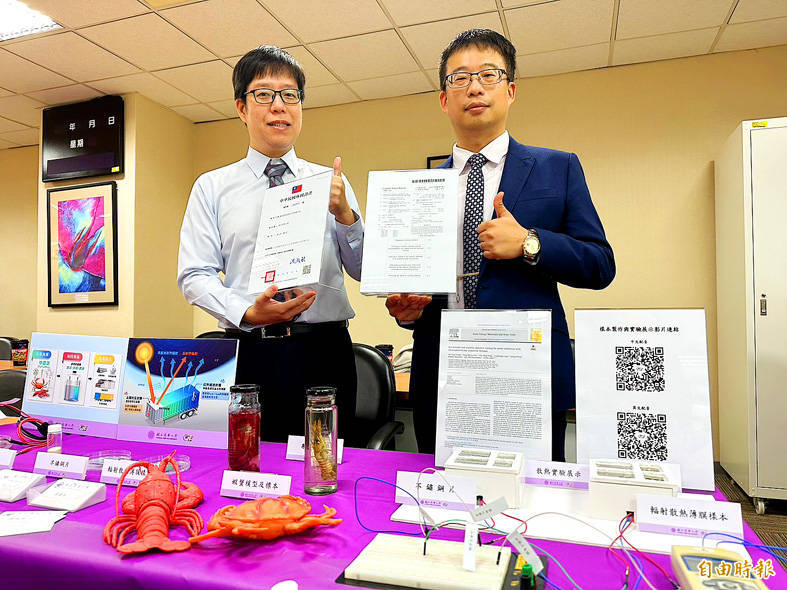《TAIPEI TIMES》 Chitin usable for heat dissipation on metal: researchers

National Tsing Hua University professor Chen Yu-bin, right, and National Yang Ming Chiao Tung University professor Chang Jui-yung present their findings in Taipei on Tuesday last week. Photo: Yang Yuan-ting, Taipei Times
CRABBY: A two-university team has made a film derived from shellfish waste that could lower heat on metal surfaces by up to 7.1°C, improving cold-chain transport
By Yang Yuan-ting and Jake Chung / Staff reporter, with staff writer
A team made up of researchers from National Tsing Hua University (NTHU) and National Yang Ming Chiao Tung University (NYMCU) has developed a heat dissipation coating material made of chitin that could help the transportation industry reduce power consumption and government efforts to be environmentally friendly.
The transportation industry sometimes uses fans or air-conditioners to help dissipate heat, as well as carbon dioxide, contributing to climate change effects.
The team, headed by NTHU professor Chen Yu-bin (陳玉彬) and NYMCU professor Chang Jui-yung (張瑞永), used bio waste such as shrimp and crab shells to create a film that is applied to metal surfaces via electroplating.
The material is capable of lowering the heat of metal surfaces by at least 2.8°C, and at most 7.1°C, the team said.
Chen said that the material, made of extracted chitin from bio waste, does not absorb infrared rays and could effectively dissipate heat via radiation.
The production process could be completed without the use of electricity, and the material could effectively reduce the heat of the metal plates it covers, Chen said, adding that the material functions,“like an air-conditioner that does not require electricity, but cannot maintain a fixed temperature.”
Chitin is a decomposable material and its manufacturing does not require specially created environments, such as high-heat or a vacuum, Chen said.
It could be used for vehicles, train cars or on transportation containers and metal storage devices, he added.
If applied to stainless steel products, the chitin coating’s heat dissipation effect is increased by 1.3 times compared with a conventional pre-coating, and its heat dissipation effects could be increased by 45 times if applied to products made with platinum, he said.
The team coated a standard container used for cold-chain transportation and found that the container decreased power consumption by 58,000Wph, Chang said.
Scientists worldwide are looking to develop heat dissipation materials, but the chitin-based material is not only the first to be made from decomposable materials, but also the first to be manufactured in an environmentally friendly manner, Chen said.
The team has tested the material’s durability when exposed to weather and found that it could last up to three months before needing to be reapplied to the containers, Chen said.
Patents for the material have been obtained in the US and Taiwan, and research on it has also been published in an international journal, Chen said, adding that the team expects to conclude talks and transfer the technology to businesses by the end of the year.
新聞來源:TAIPEI TIMES
















